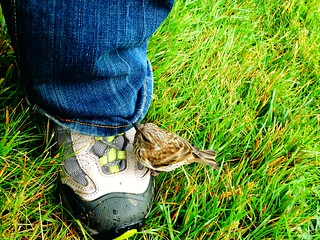by Emily Wiener, PharmD, PGY1 Pharmacy Practice Resident, Sinai
Hospital
The internet has changed nearly
every aspect of our lives. The way we communicate, shop, and learn has
fundamentally changed. Websites abound with information which can be accessed
nearly instantaneously. Social networking sites and instant messaging
applications allow us to connect with people worldwide with a simple click of
the mouse or tap on the screen. Although many social media tools were
originally developed for, well, socializing, many of them can be used for
professional and educational purposes as well. I was first introduced to the
idea of Twitter for professional education
during my first advanced pharmacy practice experience (APPE). My preceptor
(@PharmERToxGuy) along with a number of the medical residents and attending
physicians actively sent and received messages on Twitter. They used Twitter as
a means of sharing clinical pearls, staying up to date on literature, and
connecting to others in their specialty worldwide. I, in jest, joined Twitter
as my "final project.” Since then I have been surprised by what I’ve
learned. But the use of social media sites is not risk free, especially in
educational settings. It can compromise the authority of the teacher-learner
relationship and blur the lines between professional and personal life. In health
professional education, there’s the added risk of compromising patient
anonymity. Twitter use, as with most things, is all about the risk/benefit
ratio. How does one minimize these risks and maximize the quality learning
opportunities available through Twitter?
Twitter has been adopted in
various educational settings as a means to dialogue with and engage learners as
well as a forum for sharing knowledge. This
practice has been slowly adopted in health professional education. The first
paper regarding Twitter’s use in health professional education was published in
2009.1 Several reports have
been published since. Most are descriptive in nature. They address a
variety of uses including "Tweeting the Meeting", evidence based
tweeting, learner engagement, blog dissemination, and networking.1-6
With the increased use of social media, many journals have added social
media editors to their editorial team in an attempt to increase readership. The
Journal of Continuing Education in the Health Professions appointed
Alexander M. Djuricich, MD to this position in 2014. In an article he wrote
describing his position, he explained that one goals is "to connect with
the continuing education and continuous professional development community
beyond the traditional peer-reviewed publication format."2 Other
well-known journals including the Journal of the American Medical Association
(JAMA) and the British Medical Journal (BMJ) regularly send evidence-based
tweets (EBT) to their followers.2 These tweets generally contain a
brief description or pearl along with a link to the original source. The link provides
followers direct access to primary literature from an array of journals which
are relevant to practice. Learning who the right people, organizations, and
journals to follow is key to finding quality Tweets. Strategically employing hashtags is another tactic
to maximize learning.
“Tweeting the meeting” has increased substantially over the past few years
at national conferences. Many medically related conferences now have their own
hashtag(s) including the largest pharmacy conference, the ASHP Midyear Clinical
meeting (MCM). Audience members can interact with speakers, ask questions, make
comments, and archive information for retrieval after the meeting. At the ASHP
MCM in 2013, 31% of postings were related to specific educational sessions.3
The use of Twitter in conferences isn't limited to large, national
gatherings. Local conferences such as grand rounds and weekly resident
conferences have also created hashtags and taken to tweeting the meeting.6
This allows clinicians with similar interests in different geographic locations
to share experiences and improve their practice. In March 2012, a hospital in
Indiana started tweeting grand rounds. There were 613 tweets sent from 17
consecutive grand rounds presentations.4 Tweets came from users
physically attending as well as those following asynchronously. This breakdown
of geographical barriers engages learners and maximize learning opportunities.
There are a few simple tips to maximize your Twitter experience. The
quality of your Twitter feed is directly related to who you follow. Be
selective! Identifying experts in your
specialty area is key to increasing the quality of the Tweets you read. Even
when following the “right” people (the so called twitterati), it’s important to
maintain a skeptical eye. Remember, Tweets are not always evidence based and
they certainly aren’t peer reviewed literature. They are often opinions or über
brief summaries of primary literature or anecdotal reports. It is important to
read the literature and draw your own conclusions. If you disagree with the
Tweeter, respectfully respond and engage in a discussion. Just like face-to-face
dialog, the best learning often comes from professional differences of
opinion. But it’s important to remain professional. Don’t be a TrashTweeter! And don’t use your
professional title or credentials without first checking your institution’s
policies regarding social media use. Recently, the Royal Pharmacuetical Society
published a guidance document.7 Once you’ve built your Twitter
network and start meeting people at conferences, it can be difficult to keep
use strictly professional. If you want to use Twitter for social purposes too,
consider creating a separate personal account. This helps to keep a clearer
division between the two.
Twitter can be a great resource for connecting with experts in your field,
staying up to date on primary literature, and engaging at conferences. If you
are a twewbie, learning twettiquette
can help you navigate the Twitosphere. Getting started is easy. Fly on over,
create an account, and start reading what people have to say. You might be surprised
by what you learn.
[Editor's note: For more detailed
instructions on how to create a Twitter account and some recommended twitter
feeds for health professionals, visit Using
Twitter for Professional Development on the iForumRx.org website. Follow us at @iforumrx.]
References
- Williams, SA Terras, M Warwick, C. How Twitter is studied in the medical professions: A classification of Twitter papers indexed in PubMed. Med 2.0. 2013;2(2):e2 DOI: 10.2196/med20.2269.
- Djuricich, AM. Social Media, Evidence-Based Tweeting, and JCEHP. JCEHP 2014; 34(4): 202-4.
- Awad, NI Cocchio, C. Use of Twitter at a major national pharmacy conference. Am J Hosp Pharm. 2015;72:65-9.
- Djuricich, AM Zee-Cheng, JE. Live Tweeting in medicine: 'Tweeting the meeting.' International Review of Psychiatry. 2015;27(2):133-9.
- Jalali, A. "Why do you Tweet, Anyway?" A glance into medical education tweeting. [Internet] AM Rounds: Beyond the pages of academic medicine. 2015 June - [Cited 2015 Sept 20].
- Joshi, N. Introducing #EMConf Twitter hashtag. [Internet]. Academic Life in Emergency Medicine. 2013 Aug - [cited 2015 Sept 20].
- Royal Pharmaceutical Society. Social media guidance for pharmacists. [Internet]. Royal Pharmaceutical Society. Accessed 2015 Sept 27.

